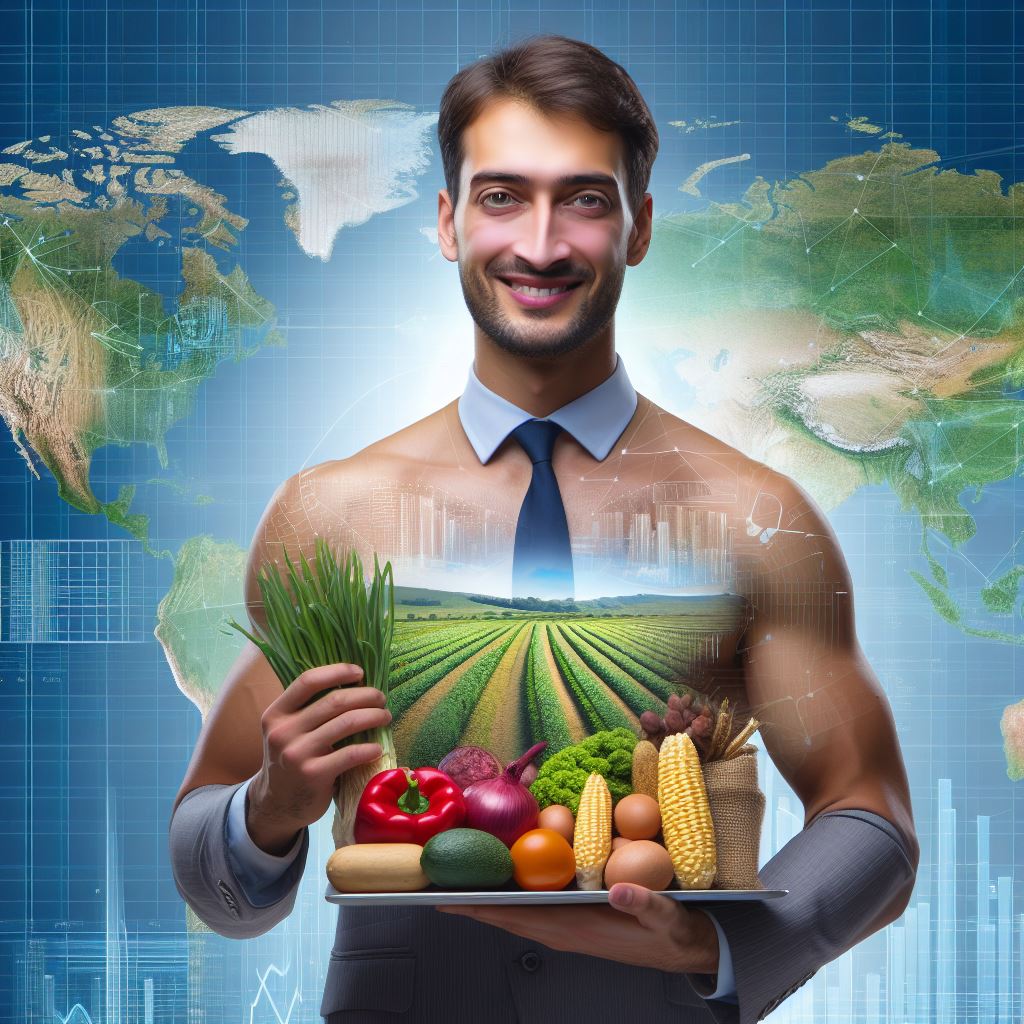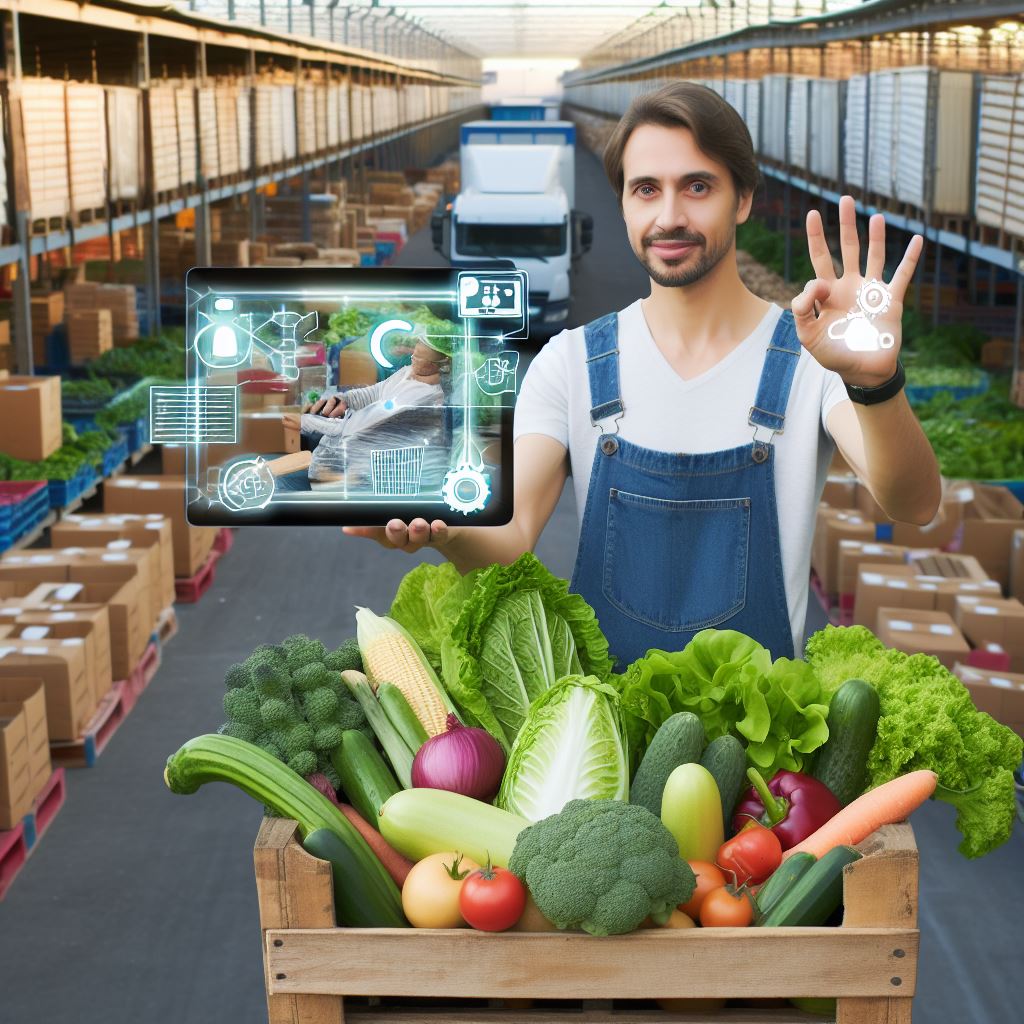Introduction
Let’s explore Global Trends in Agricultural Supply Chains.
Brief overview of the importance of agricultural supply chains
In today’s interconnected world, agricultural supply chains are of utmost importance for ensuring food security and economic development.
These supply chains encompass the various processes involved in the production, storage, transportation, and marketing of agricultural products.
They link farmers, producers, distributors, retailers, and consumers, facilitating the flow of goods from farm to table.
The significance and relevance of global trends in these supply chains
The significance and relevance of global trends in agricultural supply chains cannot be overstated.
These trends are shaped by factors such as technological advancements, changing consumer preferences, and environmental concerns.
As such, they have a far-reaching impact on the efficiency, sustainability, and resilience of agricultural systems worldwide.
One key global trend in agricultural supply chains is the increasing adoption of digital technologies.
These technologies, such as remote sensing, blockchain, and data analytics, enable real-time monitoring and decision-making, improving traceability, quality control, and supply chain transparency.
They also facilitate the integration of smallholder farmers into value chains, enabling them to access markets and receive fair prices for their produce.
Another significant trend is the growing focus on sustainability and resilience.
With climate change and resource scarcity becoming pressing concerns, there is a shift towards more environmentally friendly and socially responsible practices.
This includes the use of precision agriculture techniques, organic farming methods, and the reduction of food waste throughout the supply chain.
Global trends in agricultural supply chains have ripple effects across economies and societies.
They shape food availability, affordability, and quality, affecting both producers and consumers.
Transform Your Agribusiness
Unlock your farm's potential with expert advice tailored to your needs. Get actionable steps that drive real results.
Get StartedFurthermore, they have implications for food security, poverty reduction, and rural development globally.
In general, understanding and addressing global trends in agricultural supply chains are essential for creating a sustainable and resilient food system.
By embracing innovation, sustainability, and inclusivity, we can navigate the challenges and opportunities that lie ahead in the ever-evolving world of agriculture.
Definition of Agricultural Supply Chains
Explanation of what comprises an agricultural supply chain
In the agricultural industry, a supply chain refers to the sequence of processes involved in producing and delivering agricultural products from the farm to the consumer.
It encompasses all the steps, from cultivation, harvesting, and processing to transportation, distribution, and retailing.
At its core, an agricultural supply chain starts with farmers who cultivate and harvest crops or raise livestock.
Their produce then moves through various stages before reaching the end consumer.
The supply chain includes intermediaries, such as wholesalers, processors, distributors, and retailers, who play crucial roles in linking producers and consumers.
Identification of key players involved in the supply chain
Farmers grow crops and raise livestock, providing essential raw materials for food production.
Wholesalers buy produce from farmers and sell them to retailers in smaller quantities.
Processors transform raw agricultural produce into processed food products ready for consumption.
Distributors transport products from processors to retailers or directly to consumers.
Retailers make agricultural products available to consumers through various channels.
Consumers purchase and consume agricultural products, influencing the entire supply chain.
Government and regulatory bodies set policies, regulations, and standards for safety and quality.
Financial institutions provide loans, insurance, and financial services to agricultural stakeholders.
Technology and data providers offer tools for farm management, logistics, and data analytics.
NGOs and certification bodies promote sustainability and ethical practices in the agricultural industry.
The agricultural supply chain involves various stakeholders collaborating to ensure efficiency and sustainability.
This interconnected system adapts to global trends and demands for transparency and traceability.
Read: Farm-to-Market: Navigating Supply Challenges
Key Challenges in Global Agricultural Supply Chains
Overview of the main challenges faced by agricultural supply chains worldwide
- Inefficient transportation and logistics leading to delays and spoilage of agricultural products.
- Poor infrastructure and inadequate storage facilities affecting the quality and quantity of produce.
- Lack of access to credit and financing options for small-scale farmers and suppliers.
Factors such as climate change, population growth, and resource scarcity affecting supply chains
- Climate Change: Rising temperatures, erratic weather patterns, and extreme events pose risks to agricultural production, resulting in reduced yields, damaged crops, and increased pest and disease outbreaks.
- Population Growth: The growing global population places pressure on agricultural supply chains to produce more food, leading to increased demand for inputs, land, and water resources.
- Resource Scarcity: Depletion of natural resources, including water scarcity and soil erosion, affects agricultural productivity and sustainability, necessitating efficient resource management and conservation practices.
Examples of specific challenges in different regions or countries
- Sub-Saharan Africa: Limited access to markets, inadequate rural infrastructure, and low agricultural productivity hinder supply chains.
- South Asia: Vulnerability to climate change, inadequate irrigation systems, and high post-harvest losses impede supply chains.
- Latin America: Deforestation, land degradation, and issues with traceability in supply chains affect sustainability and market access.
- North America: Labor shortages, increasing regulations, and changing consumer preferences for organic and locally sourced products pose challenges.
- Europe: Stringent food safety and quality regulations, import competition, and limited access to finance hinder supply chain efficiency.
Ultimately, agricultural supply chains face numerous challenges that need to be addressed to ensure food security, sustainability, and profitability.
By identifying and understanding these challenges, stakeholders can work together to implement solutions that improve efficiency, resilience, and inclusivity in global agricultural supply chains.
Read: Agricultural Grants: How to Apply
Showcase Your Farming Business
Publish your professional farming services profile on our blog for a one-time fee of $200 and reach a dedicated audience of farmers and agribusiness owners.
Publish Your ProfileEmerging Trends in Agricultural Supply Chains
The agricultural industry continues to evolve, driven by changing consumer preferences, technological advancements, and sustainability concerns.
In this section, we will explore the emerging trends in global agricultural supply chains.
Introduction to Various Emerging Trends in Global Agricultural Supply Chains
The global agricultural supply chain is undergoing significant changes due to various emerging trends.
These trends are shaping the way producers, suppliers, and consumers interact in the agricultural industry.
One of the key emerging trends is the increasing adoption of technology in agricultural practices.
Technological advancements, such as precision agriculture and automation, are revolutionizing the way crops are grown and harvested.
Technological Advancements, such as Precision Agriculture and Automation
Precision agriculture is a farming approach that utilizes data analysis, satellite imagery, and GPS technology to optimize crop production.
It enables farmers to make informed decisions about planting, fertilizing, and irrigation techniques, resulting in higher yields and reduced resource wastage.
Automation is another significant technological advancement transforming agricultural supply chains.
Automated machines and robotics are replacing manual labor, enhancing efficiency, and reducing costs.
This automation not only speeds up processes but also minimizes the risk of human errors.
Analysis of Sustainability Practices and the Growing Demand for Organic and Locally Sourced Products
Sustainability has become a top priority for consumers and companies alike.
In response to the rising awareness about environmental concerns, agriculture is witnessing a shift towards sustainable practices.
This trend includes the growing demand for organic and locally sourced products.
Consumers are increasingly seeking food options that are produced without the use of synthetic fertilizers, pesticides, and genetically modified organisms.
Additionally, there is a rising preference for products that support local farmers and reduce carbon footprints associated with extensive transportation.
Innovative Supply Chain Models, such as Farm-to-Table and Direct-to-Consumer
Alongside technological advancements and sustainability practices, new supply chain models are emerging to meet evolving consumer demands.
Two such models are farm-to-table and direct-to-consumer.
Farm-to-table focuses on shortening the supply chain by connecting farmers directly with restaurants or consumers.
This model eliminates intermediaries, ensuring fresher produce, greater transparency, and fairer prices for both farmers and consumers.
Direct-to-consumer is a model where producers sell their products directly to consumers through online platforms or local farmers’ markets.
By bypassing traditional retail channels, farmers can establish direct relationships with consumers, creating a sense of trust and loyalty.
Overall, the agricultural supply chain is experiencing several emerging trends.
Technological advancements, sustainability practices, and innovative supply chain models are transforming the global agricultural industry.
As these trends continue to evolve, it is crucial for stakeholders to adapt and embrace these changes to stay competitive and meet the evolving demands of consumers.
Read: Drones in Agri: Optimizing Supply Logistics

Impacts of Global Trends on Agricultural Supply Chains
Examination of the effects of global trends on supply chain efficiency and productivity
Global trends such as advanced technology and digitalization have significantly improved supply chain efficiency.
Automation and robotics have streamlined processes and reduced human error in agricultural supply chains.
Real-time data analysis allows for better demand forecasting and inventory management, enhancing productivity.
Improved transportation infrastructure enables faster and more reliable delivery of agricultural products worldwide.
Efficient supply chain management helps reduce waste and spoilage, maximizing the utilization of resources.
Analysis of the influence of consumers’ changing preferences on supply chain operations
Changing consumer preferences, such as the demand for organic and sustainable products, affect supply chain strategies.
Agricultural supply chains are adapting to meet the increasing demand for locally sourced and ethically produced goods.
Supply chain transparency is becoming a critical factor as consumers want to know the origin and production practices of their food.
The need to maintain product quality throughout the supply chain has led to enhanced quality control measures.
To cater to specific preferences, supply chains are diversifying product offerings and implementing customized packaging solutions.
Exploration of potential economic, social, and environmental benefits of these trends
Global trends in agricultural supply chains contribute to economic growth by expanding market opportunities for producers.
Efficient supply chains support job creation and improved livelihoods in both rural and urban areas.
Sustainable practices in supply chains, such as reducing carbon emissions, contribute to environmental conservation.
Consumer demand for environmentally friendly products drives innovation in sustainable farming methods.
Showcase Your Farming Business
Publish your professional farming services profile on our blog for a one-time fee of $200 and reach a dedicated audience of farmers and agribusiness owners.
Publish Your ProfileTransparency in supply chains promotes social accountability and fosters trust between consumers and producers.
Essentially, global trends have a profound impact on agricultural supply chains, influencing efficiency, productivity, and customer satisfaction.
As technology continues to advance and consumer preferences evolve, supply chains must adapt to stay competitive and sustainable.
Embracing these trends not only benefits the economy but also creates positive social and environmental outcomes.
Read: Green Supply Chain: The Future of Farming
Gain More Insights: Smart Farming: IoT’s Role in Agriculture
Case Studies and Examples
Presentation of real-world examples showcasing successful implementation of global trends in agricultural supply chains
- Delta Agriculture, a leading agribusiness company, successfully implemented the use of blockchain technology in their supply chain.
- They were able to track every step, from farm to market, ensuring transparency and efficiency.
- By implementing this global trend, Delta Agriculture experienced a significant reduction in fraud and improved traceability.
- This allowed them to provide their customers with the assurance of quality and sustainability.
Analysis of the outcomes and benefits experienced by the case studies
- Increased Efficiency: The use of global trends in agricultural supply chains has led to increased efficiency in operations. Companies like Delta Agriculture were able to streamline their processes and reduce wasted resources.
- Improved Transparency: One of the key benefits of implementing global trends is improved transparency throughout the supply chain. Consumers can now trace the origin of their products, ensuring ethical and sustainable practices.
- Reduced Risk: With improved traceability, companies can better identify and mitigate risks in their supply chains. For example, if a product is found to be contaminated, the company can quickly pinpoint the source and take appropriate action.
- Enhanced Sustainability: Global trends in agricultural supply chains focus on promoting sustainable practices. Companies that adopt these trends can reduce their environmental impact and support local communities.
- Consumer Trust: Implementing global trends in agricultural supply chains builds consumer trust. By providing transparent information about the origin and quality of products, companies can gain loyal customers.
Most importantly, the successful implementation of global trends in agricultural supply chains, as demonstrated by real-world examples like Delta Agriculture, has brought numerous benefits to the industry.
These trends have increased efficiency, improved transparency, reduced risk, enhanced sustainability, and built consumer trust.
By embracing these global trends, companies can stay competitive, meet consumer expectations, and contribute to a more sustainable future for agriculture.
Conclusion
Recap of the main points discussed in the blog post
In this blog section, we have explored the various global trends affecting agricultural supply chains.
We discussed the importance of leveraging technology, such as blockchain and artificial intelligence, to improve transparency and efficiency in these supply chains.
Additionally, we delved into the growing consumer demand for sustainable and ethically sourced agricultural products, prompting the need for environmentally friendly practices.
We also touched upon the increasing role of data analytics and predictive modeling in optimizing logistics and production processes.
The ability to analyze and predict market demand empowers farmers to make informed decisions, reducing waste and maximizing profits.
Emphasis on the significance and potential of global trends in shaping the future of agricultural supply chains
The significance of these global trends cannot be overstated.
They not only present opportunities for farmers and businesses to meet the demands of an ever-changing market but also contribute to the overall sustainability of the agricultural industry.
By embracing these trends, agricultural supply chains can become more resilient, adaptable, and responsive to challenges such as climate change and resource scarcity.
Furthermore, the potential for increased collaboration and knowledge sharing among stakeholders can lead to innovative solutions and ultimately, a more efficient and sustainable agricultural sector.
All in all, it is clear that global trends have a profound impact on the future of agricultural supply chains.
As we navigate the complexities of a changing world, it is crucial for farmers, businesses, and policymakers to recognize the significance of these trends and actively work towards harnessing their potential.
By doing so, we can ensure the continued growth and resilience of the agricultural industry, while meeting the evolving needs of consumers and preserving our planet for future generations.




